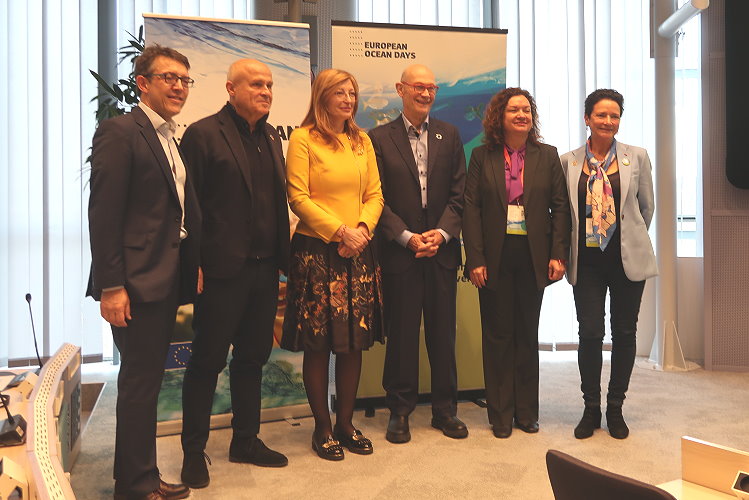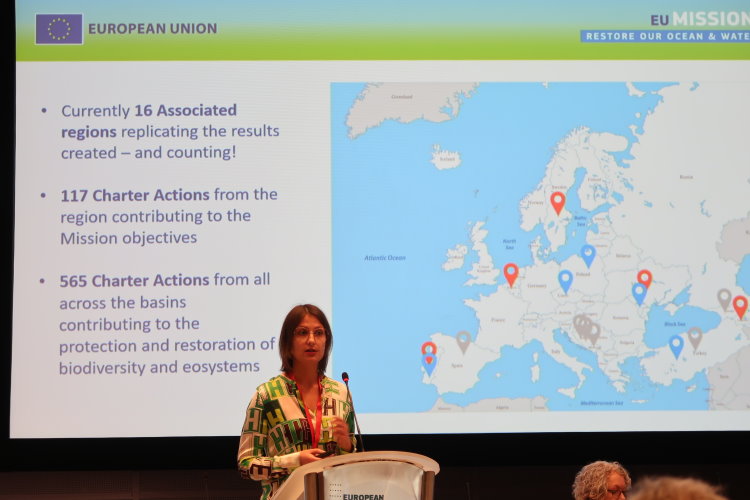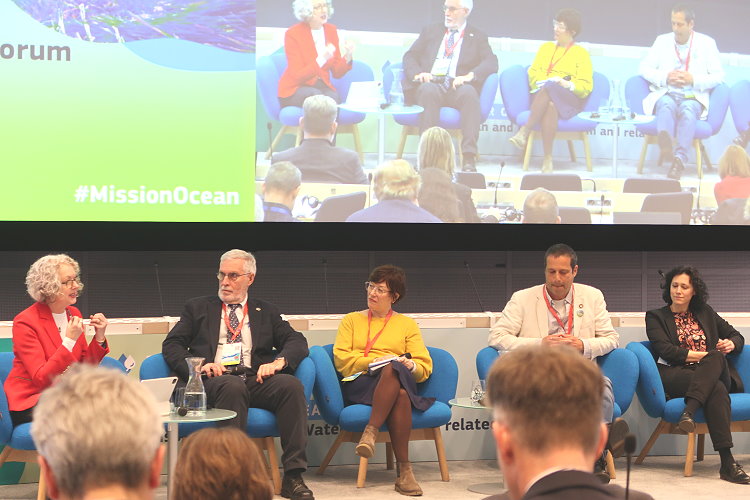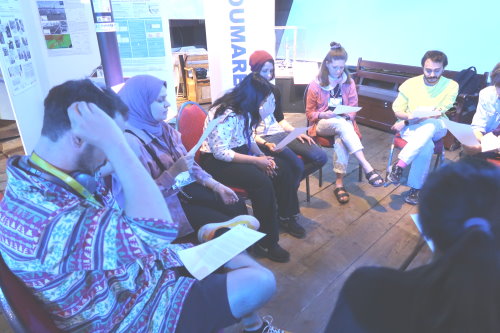The EU Mission ‘Restore our Ocean and Waters’ held its third annual forum meeting on 4 March 2025 in the Charlemagne Building in Brussels. The opening was managed by ‘the usual suspects’ including Pascal Lamy, the Mission Board Chair, preceded by European Commissioners Costas Kadis, in charge of Fisheries and Oceans, and Ekaterina Zaharieva, in charge of Start-ups, Research and Innovation.

From left to right: MEP Christophe Clergeau, Ambassador, Olivier Poivre d’Arvor, EU Commissioner for Start-ups, Research and Innovation Ekaterina Zaharieva, Mission Board Chair Pascal Lamy, a representative of EU Commissioner for Fisheries and Oceans Costas Kadis, and Director of Jacques Delors Institute Sylvie Matelly.
Speaking after two EU Commissioners, the French Ambassador to the UN Ocean Conference (UNOC3) in Nizza, 9-13 June 2025, Olivier Poivre d’Arvor, reminded the audience that Europe with its overseas territories has globally the largest Exclusive Economic Zone (EEZ) and great responsibility for the ocean. He placed particular emphasis on the challenge to step up the exploration of the ocean. He emphasised the need for all EU member states to urgently ratify the High Seas Treaty (BBNJ) so that a sufficient number of ratifications can be announced at UNOC3 for the BBNJ Treaty to enter into force and justify a special space for this achievement at the conference.
MEP Christophe Clergeau, representing the Seas, Rivers, Islands and Coastal Areas Intergroup of the European Parliament, spoke forcefully in favour of the implementation of the many good European Environment Directives and the provisions of the Common Fisheries Policy. He underlined that this was crucial to reap the benefits of good environmental status and the prohibition of overfishing. Anything short of that would undermine the credibility among citizens.
Pascal Lamy summarised his key concerns – we need hope, confidence and pride in our efforts to heal and protect the ocean. He expressed his gratitude to the many project participants and efforts by staff in the many organisations and institutions to translate Mission Starfish into an impressive array of activities. He wants everybody to understand the ocean as a planetary system and argues in favour of a European Ocean Pact currently under development as a major contribution to UNOC3 and well beyond.
On the road to the Ocean Pact, Kestutis Sadauskas, Mission Manager at the Commission’s Directorate General MARE, listed many of the ‘irons already in the fire’, among them:
- four work programmes published and funded projects launched, each with a particular thematic focus to make a difference; the forthcoming fifth will focus on pollution;
- 52 regions across Europe have applied and were selected to be associated to the mission efforts;
- more than 1000 commitments have been recorded to help implement the mission charter, mobilising around seven billion Euro;
- replication of successful projects is encouraged and the alignment of next generation of EU funding instruments is currently under discussion together with a recovery and resilience fund;
- The soil and the starfish missions are developing joint activities.

Selected Starfish Mission achievements across European seas and waterways
The packed sessions each offered examples from individual projects from across Europe that are intended as beacons of real change. They were grouped under such titles as ‘Protecting and restoring marine and freshwater ecosystems’, ‘Preventing and eliminating pollution’, ‘Climate neutrality and circularity in the blue economy’, ‘European Digital Twin of the Ocean’, ‘Public engagement for the restoration of ocean and waters’, and ‘Funding the deployment and upscaling for the restoration of the ocean and waters – synergies with public and private funds’.
Many speakers evoked the importance of engaging on a broader front with citizens across the continent, but that fundamental aspect still receives too little attention. The pitch by Afşin Çetinkaya of the SHORE project in Turkiye showed more than 100 school projects, some 50 twinned schools with many in the network of European Blue Schools, more than 3000 users on their digital platform animated also by more than a dozen events.

One of the panel discussions
That is a very valuable contribution towards more ocean literacy and engagement towards marine protection.
But in the absence of ocean topics in the curricula of most European countries and only project-based initiatives, the mismatch between the scale of the engagement challenge and the often heroic dedication of individual project participants was only too visible.

Role Play at the YouMaRes Conference in Hamburg
This is why Mundus maris participant Cornelia Nauen used all opportunities for networking during the breaks to draw attention to the ‘Protecting Blue Horizons’ role play intended as a low-key trigger for kindling more interest in the ocean among young adults. The material of the role play can be made available free of charge to any school, university or organisation interested, by contacting info(at)mundusmaris.org.
In the current climate of crisis, uncertainty and tensions, bringing many more people on board for cooperation at all levels for a healthy ocean, healthy rivers and thriving coastal communities is of capital importance.
The meeting agenda with more information is available here.
One can always argue for more and better efforts, but no doubt, a lot of interesting results are becoming available through the combined efforts of the mission. The more the individual activities connect to the living conditions of citizens the more the lessons learnt will inspire adaption and upscaling or outscaling to other places and regions in Europe.
